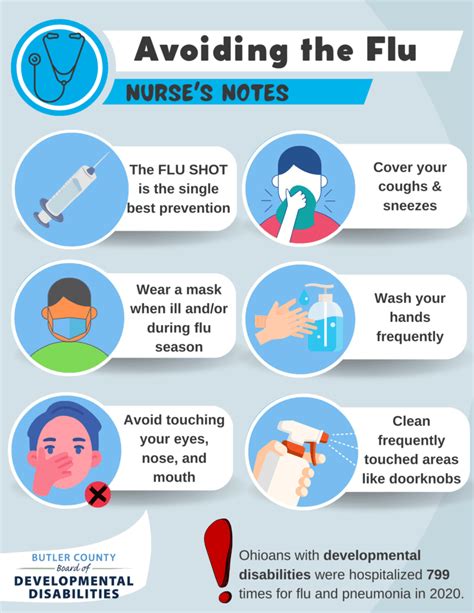12+ Ways To Avoid The Flu This Season

As the winter months approach, the flu season is upon us, bringing with it a host of unwanted symptoms and disruptions to our daily lives. The flu, or influenza, is a highly contagious respiratory illness caused by the influenza virus. It can range from mild to severe and can affect anyone, regardless of age or health status. While there’s no guaranteed way to completely avoid the flu, there are several strategies that can significantly reduce your risk of contracting it. Here are 12+ ways to help you navigate the flu season with greater ease and lower your chances of falling ill.
1. Get Vaccinated
The most effective way to prevent the flu is by getting vaccinated. The flu vaccine is formulated each year to protect against the most common strains of the virus expected to circulate during the upcoming flu season. It’s recommended that everyone 6 months of age and older should get a flu vaccine each year, with certain groups like the elderly, young children, and people with certain health conditions being at higher risk and thus benefiting even more from vaccination.
2. Practice Good Hygiene
Good hygiene is your first line of defense against the flu. This includes: - Washing Your Hands Frequently: Use soap and water for at least 20 seconds, especially after using the toilet, before eating, and after blowing your nose, coughing or sneezing. - Using Hand Sanitizer: When soap and water are not available, use an alcohol-based hand sanitizer. - Avoiding Close Contact with people who are sick. - Not Touching Your Eyes, Nose, and Mouth, as these are common ways for the flu virus to enter the body.
3. Stay Home When Sick
If you do get sick, stay home from work or school to prevent spreading the flu to others. This not only helps prevent the spread of the virus but also gives your body the rest it needs to recover.
4. Maintain a Healthy Lifestyle
A healthy lifestyle can help boost your immune system, making you less susceptible to the flu. This includes: - Eating a Balanced Diet rich in fruits, vegetables, whole grains, and lean proteins. - Staying Hydrated by drinking plenty of water. - Getting Enough Sleep, aiming for 7-9 hours each night for adults. - Exercising Regularly, aiming for at least 150 minutes of moderate-intensity aerobic activity or 75 minutes of vigorous-intensity aerobic activity a week, or an equivalent combination of both.
5. Manage Stress
Chronic stress can weaken your immune system, making you more vulnerable to illness. Engage in stress-reducing activities like meditation, yoga, or deep breathing exercises.
6. Avoid Smoke and Pollution
Both first-hand and second-hand smoke can increase your risk of respiratory illnesses, including the flu. Limit your exposure to smoke and polluted air.
7. Clean and Disinfect
Regularly clean and disinfect surfaces and objects that may be contaminated with flu virus, especially in high-traffic areas and after someone has been ill.
8. Consider Taking Supplements
Certain supplements like vitamin C, vitamin D, and zinc may help boost your immune system. However, always consult with a healthcare provider before adding any supplements to your routine.
9. Stay Informed
Stay updated on the latest flu outbreaks and trends in your area. This information can help you take extra precautions during periods of high flu activity.
10. Use a Humidifier
Dry air can make your respiratory system more susceptible to infection. Using a humidifier can help keep the air moist and your respiratory system healthy.
11. Protect Your Family
If you live with others, especially those who are at high risk for flu complications, take extra precautions to prevent the spread of the flu in your household.
12. Antiviral Medications
In some cases, your healthcare provider may prescribe antiviral medications to help prevent the flu, especially if you’ve been exposed to someone with the flu or if you’re at high risk for complications.
Additional Tips
- Stay Active: Regular physical activity can help keep your immune system strong.
- Limit Alcohol Consumption: Excessive alcohol use can impair your immune system.
- Get Enough Fresh Air: Spending time outdoors and getting fresh air can be beneficial, but avoid close contact with others if they are sick.
Conclusion
While the flu can be unpredictable, by following these 12+ strategies, you can significantly reduce your risk of contracting the flu this season. Remember, prevention is key, and a combination of good hygiene, a healthy lifestyle, and awareness can go a long way in keeping you and your loved ones safe from the flu.
FAQ Section
What is the best way to prevent the flu?
+The best way to prevent the flu is by getting vaccinated each year. The flu vaccine is designed to protect against the most common strains of the flu virus for that season.
How long does it take for flu symptoms to appear after exposure?
+Typically, symptoms of the flu can start to appear anywhere from 1 to 4 days after exposure to the virus, with 2 days being the average.
Can you get the flu from the flu vaccine?
+No, you cannot get the flu from the flu vaccine. The flu vaccine is made from inactivated flu virus or a single protein from the flu virus, which cannot cause the flu. Some people may experience side effects like soreness at the injection site, fever, or body aches, but these are generally mild and short-lived.
What should I do if I get the flu?
+If you get the flu, the most important thing is to stay home and rest. This can help your body recover and prevent you from spreading the flu to others. Stay hydrated by drinking plenty of fluids, and consider over-the-counter medications to relieve symptoms. If your symptoms worsen or you are at high risk for complications, consult with your healthcare provider.
By taking proactive steps and being informed, you can navigate the flu season with confidence and reduce your risk of falling ill. Remember, health is always a priority, and taking care of yourself is the first step towards a healthier, happier you.


